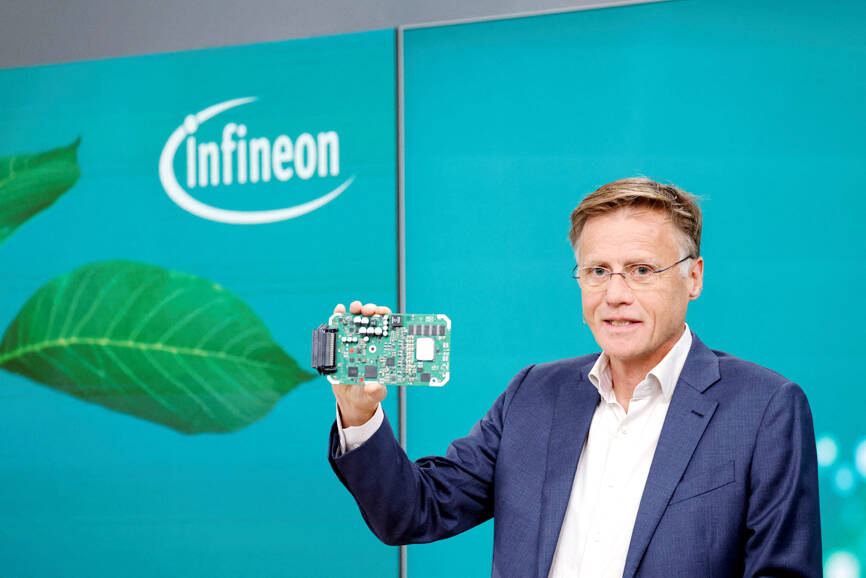Infineon Technologies AG reported revenue that missed analysts’ expectations after the hoped-for resurgence in the electric vehicle (EV) market was delayed.
Sales fell 9.5 percent to 3.7 billion euros (US$4.1 billion) in the past quarter from the same period a year ago, the company said yesterday. That compared to the average 3.79 billion analyst forecast compiled by Bloomberg.
Infineon’s segment result margin, a measure of profitability, was 19.8 percent for the quarter, in line with analysts’ estimates.

Photo: Michaela Rehle, Reuters
Infineon is among the European chipmakers that specialize in making the type of chips used in cars and have grown especially dependent on automakers for their sales.
The company, alongside peers STMicroelectronics NV and NXP Semiconductors NV, has been affected by the auto industry’s pullback from EVs, which in turn has been driven by higher interest rates, weaker-than-expected economic growth and a continued lack of charging stations.
“Prolonged weak economic momentum has resulted in inventory levels in many areas overlaying end demand,” Infineon CEO Jochen Hanebeck said. “In addition to managing the current demand cycle, we are working on further strengthening our competitiveness.”
Infineon said it forecast revenue this quarter to drop from a year earlier to about 4 billion euros, and anticipates a segment result margin of about 20 percent. Analysts had anticipated revenue of 3.94 billion euros and segment result margin of about 22 percent.
Sales from Infineon’s automotive business, its largest, were 2.11 billion euros last quarter. That compared to 2.13 billion euros a year earlier, but was a sequential improvement from the previous quarter, because of an increase in “software-defined” vehicles, the company said.
These cars use Infineon’s chips to help run systems that connect sensors and computers inside vehicles.
Infineon also said it would slash 1,400 jobs and relocate 1,400 more due to a tough market environment.
The job cuts, from a workforce of about 58,600 worldwide, are part of a company-wide restructuring that was launched in May.
The program is aimed at "strengthening our competitiveness," Hanebeck said.
Additional reporting by AFP

When an apartment comes up for rent in Germany’s big cities, hundreds of prospective tenants often queue down the street to view it, but the acute shortage of affordable housing is getting scant attention ahead of today’s snap general election. “Housing is one of the main problems for people, but nobody talks about it, nobody takes it seriously,” said Andreas Ibel, president of Build Europe, an association representing housing developers. Migration and the sluggish economy top the list of voters’ concerns, but analysts say housing policy fails to break through as returns on investment take time to register, making the

NOT TO WORRY: Some people are concerned funds might continue moving out of the country, but the central bank said financial account outflows are not unusual in Taiwan Taiwan’s outbound investments hit a new high last year due to investments made by contract chipmaker Taiwan Semiconductor Manufacturing Co (TSMC, 台積電) and other major manufacturers to boost global expansion, the central bank said on Thursday. The net increase in outbound investments last year reached a record US$21.05 billion, while the net increase in outbound investments by Taiwanese residents reached a record US$31.98 billion, central bank data showed. Chen Fei-wen (陳斐紋), deputy director of the central bank’s Department of Economic Research, said the increase was largely due to TSMC’s efforts to expand production in the US and Japan. Investments by Vanguard International

WARNING SHOT: The US president has threatened to impose 25 percent tariffs on all imported vehicles, and similar or higher duties on pharmaceuticals and semiconductors US President Donald Trump on Wednesday suggested that a trade deal with China was “possible” — a key target in the US leader’s tariffs policy. The US in 2020 had already agreed to “a great trade deal with China” and a new deal was “possible,” Trump said. Trump said he expected Chinese President Xi Jinping (習近平) to visit the US, without giving a timeline for his trip. Trump also said that he was talking to China about TikTok, as the US seeks to broker a sale of the popular app owned by Chinese firm ByteDance Ltd (字節跳動). Trump last week said that he had

STRUGGLING TO SURVIVE: The group is proposing a consortium of investors, with Tesla as the largest backer, and possibly a minority investment by Hon Hai Precision Nissan Motor Co shares jumped after the Financial Times reported that a high-level Japanese group has drawn up plans to seek investment from Elon Musk’s Tesla Inc to aid the struggling automaker. The group believes the electric vehicle (EV) maker is interested in acquiring Nissan’s plants in the US, the newspaper reported, citing people it did not identify. The proposal envisions a consortium of investors, with Tesla as the largest backer, but also includes the possibility of a minority investment by Hon Hai Precision Industry Co (鴻海精密) to prevent a full takeover by the Apple supplier, the report said. The group is